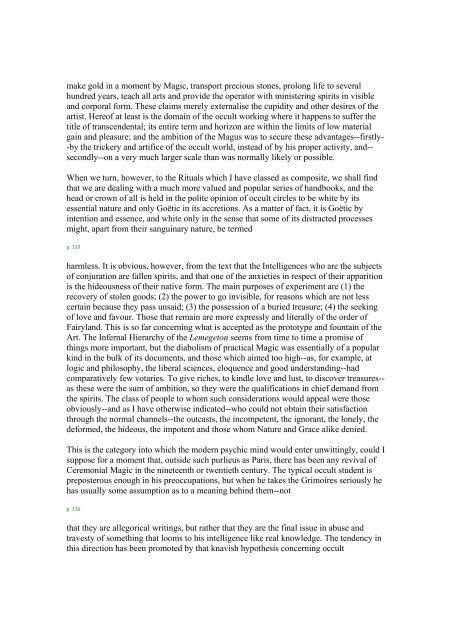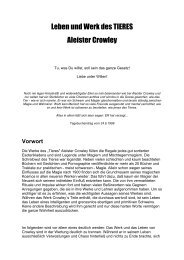The Book of ceremonial Magic
The Book of ceremonial Magic
The Book of ceremonial Magic
Create successful ePaper yourself
Turn your PDF publications into a flip-book with our unique Google optimized e-Paper software.
make gold in a moment by <strong>Magic</strong>, transport precious stones, prolong life to several<br />
hundred years, teach all arts and provide the operator with ministering spirits in visible<br />
and corporal form. <strong>The</strong>se claims merely externalise the cupidity and other desires <strong>of</strong> the<br />
artist. Here<strong>of</strong> at least is the domain <strong>of</strong> the occult working where it happens to suffer the<br />
title <strong>of</strong> transcendental; its entire term and horizon are within the limits <strong>of</strong> low material<br />
gain and pleasure; and the ambition <strong>of</strong> the Magus was to secure these advantages--firstly-<br />
-by the trickery and artifice <strong>of</strong> the occult world, instead <strong>of</strong> by his proper activity, and--<br />
secondly--on a very much larger scale than was normally likely or possible.<br />
When we turn, however, to the Rituals which I have classed as composite, we shall find<br />
that we are dealing with a much more valued and popular series <strong>of</strong> handbooks, and the<br />
head or crown <strong>of</strong> all is held in the polite opinion <strong>of</strong> occult circles to be white by its<br />
essential nature and only Goëtic in its accretions. As a matter <strong>of</strong> fact, it is Goëtic by<br />
intention and essence, and white only in the sense that some <strong>of</strong> its distracted processes<br />
might, apart from their sanguinary nature, be termed<br />
p. 335<br />
harmless. It is obvious, however, from the text that the Intelligences who are the subjects<br />
<strong>of</strong> conjuration are fallen spirits, and that one <strong>of</strong> the anxieties in respect <strong>of</strong> their apparition<br />
is the hideousness <strong>of</strong> their native form. <strong>The</strong> main purposes <strong>of</strong> experiment are (1) the<br />
recovery <strong>of</strong> stolen goods; (2) the power to go invisible, for reasons which are not less<br />
certain because they pass unsaid; (3) the possession <strong>of</strong> a buried treasure; (4) the seeking<br />
<strong>of</strong> love and favour. Those that remain are more expressly and literally <strong>of</strong> the order <strong>of</strong><br />
Fairyland. This is so far concerning what is accepted as the prototype and fountain <strong>of</strong> the<br />
Art. <strong>The</strong> Infernal Hierarchy <strong>of</strong> the Lemegeton seems from time to time a promise <strong>of</strong><br />
things more important, but the diabolism <strong>of</strong> practical <strong>Magic</strong> was essentially <strong>of</strong> a popular<br />
kind in the bulk <strong>of</strong> its documents, and those which aimed too high--as, for example, at<br />
logic and philosophy, the liberal sciences, eloquence and good understanding--had<br />
comparatively few votaries. To give riches, to kindle love and lust, to discover treasures--<br />
as these were the sum <strong>of</strong> ambition, so they were the qualifications in chief demand from<br />
the spirits. <strong>The</strong> class <strong>of</strong> people to whom such considerations would appeal were those<br />
obviously--and as I have otherwise indicated--who could not obtain their satisfaction<br />
through the normal channels--the outcasts, the incompetent, the ignorant, the lonely, the<br />
deformed, the hideous, the impotent and those whom Nature and Grace alike denied.<br />
This is the category into which the modern psychic mind would enter unwittingly, could I<br />
suppose for a moment that, outside such purlieus as Paris, there has been any revival <strong>of</strong><br />
Ceremonial <strong>Magic</strong> in the nineteenth or twentieth century. <strong>The</strong> typical occult student is<br />
preposterous enough in his preoccupations, but when he takes the Grimoires seriously he<br />
has usually some assumption as to a meaning behind them--not<br />
p. 336<br />
that they are allegorical writings, but rather that they are the final issue in abuse and<br />
travesty <strong>of</strong> something that looms to his intelligence like real knowledge. <strong>The</strong> tendency in<br />
this direction has been promoted by that knavish hypothesis concerning occult
















